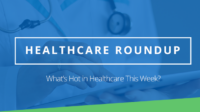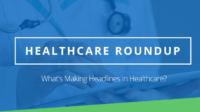From political discourse to circadian disruption, this week’s headlines were drumming with healthcare happenings. Read on for five of this week’s top stories in our healthcare roundup.
Are GOP Hopefuls’ Words on Vaccine ‘Risks’ Harmful? – MedPageToday
Potential presidential candidates took part in the second of this election season’s republican debates this week. During the event, the topic of vaccines arose, prompting Donald Trump to make a statement condemning vaccines as linked to Autism. At the time, there were two physicians on stage, Pediatric Neurosurgeon, Ben Carson and ophthalmologist, Rand Paul. While Carson touched on the lack of evidence suggesting the connection, neither of the medically trained individuals took the opportunity to address the common misconception that has been repeatedly falsified through empirical studies. While the stigma between vaccines and autism has decreased, it remains a commonly cited point of contention among anti-vaccine advocates. With recent surges in preventable diseases re-emerging, this point in the debate has the healthcare community wondering how potentially damaging this exchange was on the perception and opinion of the general population. Read more here.
Premature Babies Study Raises Debate Over Risks and Ethical Consent – New York Times
Two years ago a clinical trial was conducted testing the effect of oxygen levels on acutely premature infants. A federal watchdog agency accused the researchers of failing to appropriately disclose the risks of the methodology to the parents and families of the infants. When a significant number of the infants suffered poor outcomes or lasting ailments, several families sued the researchers, citing the outcomes as an undisclosed risk of the participation. However, a federal judge recently threw out the suit, stating that there was no evidence to suggest that the already at-risk infants suffered bad outcomes directly a result of their participation. This ruling has researchers, bioethicists, and the medical community rethinking the boundaries between informed consent, ethical research, and legal implications for clinical trials. Read more here.
Caffeine At Night Resets Your Inner Clock – NPR
It turns out, drinking coffee at night can do more then just keep you awake. In a study recently released by the University of Colorado, caffeine, widely considered the world’s most popular drug, actually impacts the body’s internal clock. According to Kenneth Wright, a sleep and circadian physiologist as UC Boulder, the circadian clock goes beyond regulating a person’s asleep and awake states. The circadian clock is an ingrained element of every cell in the human body, present in every component of the body from fat cells to brain cells. As a result, disrupted circadian rhythms, as often brought on by evening doses of caffeine, have been shown to lead to a diverse variety of harmful conditions, directly impacting the physiology of humans. Read more here.
Nearly 9 Million People Gained Insurance In Health Marketplace’s First Year – Kaiser Health News
According to the most recent census, the number of uninsured Americans dropped nearly 3% between the years of 2013 and 2014. At the start of 2013, percentage of uninsured individuals was nearly 13%. It currently hovers at approximately 10%, representing nearly 9 million people who have acquired access in that time. Researchers have stated that this is the most significant decrease of uninsured Americans on record, calling the numbers “unprecedented”. However, there are nearly 33 million Americans who remain uninsured, calling into question the remaining barriers to entry, and what steps need to be taken to insure these citizen’s coverage. Read more here.
Health care apps top 165,000; most focus on fitness – Associated Press
The IMS Institute for Healthcare Informatics released a report this week claiming smartphone users have 165,000 healthcare apps to choose from. Ranging from wellness promotion to medical condition monitoring, the apps offer a diverse range of opportunities and aids. While doctors are getting on board with recommending the use of this technology, particularly when it comes to calorie counting or exercise tracking, IMS reports that a lack of long term research and unknowns about data monitoring are limitations to expanding usage. However, the rapid increase and widespread availability is leading to researchers and the medical community wondering how the use of smartphone technology will continue to shape patient care. Read more here.
Check back next week for another recap of healthcare headlines on the BoardVitals blog.


